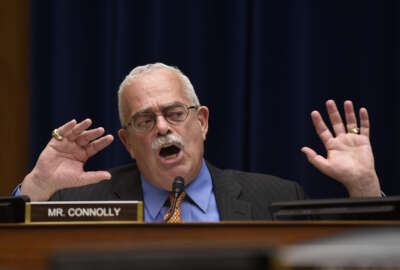
Feds facing $32B pay, pension hit: Time to bite back?
Despite dire news regarding their pay and pension plan, there may be light at the end of the tunnel for feds, if they choose to flex their political muscle.
In a worst-case scenario on Capitol Hill, federal and postal workers could be hit by changes that would permanently cut their take-home pay, make voluntary or mandatory early retirement more costly and eliminate the FERS retirement program for future hires. But there is light, maybe, at the end of the tunnel. If you flex your political muscle.
In addition to increasing employee contributions to the FERS plan (by 1 percentage point each year for six years) the budget resolution would gradually decrease the government’s share of employee-retiree health premiums. Currently, agencies pay an average of 72 percent of the total premium. Under the new budget plan, government contributions would be linked to the cost of living, gradually lowering them while forcing workers and retirees to pay a larger portion of the total premium.
When and if the budget plan is approved — and the Senate would have to agree — the government would eliminate the supplemental benefit for employees who retire before age 62 (when they become eligible for Social Security). Those supplement payments can be worth thousands of dollars. Many federal workers — law enforcement officers, firefighters and others in high-stress jobs — are forced to retire at age 57. The financial hit to them would be very serious.
There have been efforts, under both Republicans and Democrats, to reduce federal worker/retiree benefits for years. Unions, professional associations and groups representing retirees have successfully fought them off. But this year may be different.
Richard G. Thissen, president of the National Active and Retired Federal Employees Association, said the budget “sets the stage for broken promises, lower paychecks and less retirement and health security” for workers and retirees.
National Treasury Employees Union President Tony Reardon said it’s “a mean-spirited” effort to make active and retired feds pay for proposed tax cuts for the wealthy. He said feds have already lost $200 million in the name of deficit reduction and through the three-year federal pay freeze.
The Senate is taking a different budget path. When its plan is passed, it will have to be reconciled with the very different House package later this month. So the nail-biting will continue for a while. Meantime …
The good news, if you can find any from this, is that the House vote approving the budget package was close: 219-206. Nine members did not vote!
Which is where you come in.
The vast majority of federal workers are not inside the Beltway. Not even close. Feds live, work and vote in every city, town and county in the U.S. They are a major presence from Alaska and Oklahoma to North and South Carolina. And Texas. And Florida. And California. And New York, Pennsylvania, Ohio, Indiana. Just about everywhere, except maybe Vermont. In some places — Ogden,Utah and Huntsville, Alabama — the government is the employer. And local merchants who depend on the federal salary (and retiree) dollar know it. But it wouldn’t hurt to remind them. And your member of Congress. If they voted for you, thank them (using your home computer to generate the email). If they voted against, you let them know that you are out there (as in back home) and watching closely. And eagerly awaiting the next election.
So who are your potential pen pals? NARFE provided its members with a link showing how members voted. If your particular member either voted “yea” or didn’t vote, you might want to contact him/her (off duty) by phone, email or both. Here’s the link.
Nearly Useless Factoid
Tiaan Jerjerrod was the project manager of the second Death Star, which was destroyed at the end of Star Wars: Episode VI – Return of the Jedi. Supervising Jerjerrod was Emperor Palpatine’s right-hand man, Darth Vader.
Source: Death Star II: A Project Management Case Study
Copyright © 2025 Federal News Network. All rights reserved. This website is not intended for users located within the European Economic Area.
Mike Causey is senior correspondent for Federal News Network and writes his daily Federal Report column on federal employees’ pay, benefits and retirement.
Follow @mcauseyWFED





